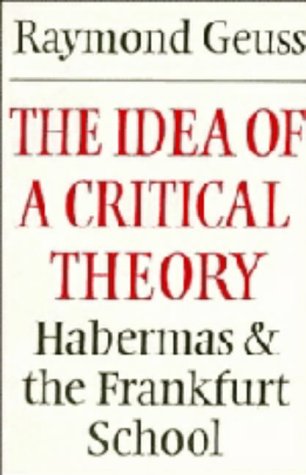

 |

|

The average rating for The idea of a critical theory based on 2 reviews is 3.5 stars.
Review # 1 was written on 2009-08-01 00:00:00 David Tan David TanCertainly, this is not an introduction to the Frankfurt School, although some seem to believe as much. It should be read alongside Horkheimer's essay, 'Traditional and Critical Theory,' Habermas' essay 'Between Philosophy and Science: Marxism as Critique,' and Adorno's 'Why Still Philosophy?' Like those essays, this book is programmatic: what *would* a critical theory do? And is it possible? So there is not a lot in here about the actual substance of any given critical theory. Nothing much about 'communicative rationality,' not much about 'negative dialectics,' not much about the 'one-dimensional society.' Rather, this book tries to explain what those projects are meant to achieve. Given this aim, Geuss succeeds admirably. The book is clear and precise. It doesn't have that kick of rebellion that you can find in Zizek or Badiou's popular works, or the slightly mystifying air of Adorno's worst work, or the hipness of Marcuse's. Some people will say this is a bad thing, and criticize Geuss for putting these ideas in clear, precise prose. Each to their own. But if you want to understand what all that rebellion and mystification and hipness is actually about, you could do worse than begin here. The one downside is that the focus here is on individuals, which is necessary for analytical ethical philosophy. 'Society,' which is really the object of critique, doesn't get much of a look in. This is a shame, but on the other hand, the book mainly deals with Habermas, and he too uses this language. It's also odd that Geuss prefers Adorno's project, but focuses on Habermas. I guess the latter's just easier to write about. |
Review # 2 was written on 2013-10-09 00:00:00 Don Sears Don SearsThis small book has several virtues and several problems. It has three chapters, the first on Ideology, the second on Interests, and the third on Critical Theory. It deploys much of the rigor and attention to conceptual analysis characteristic of analytic philosophy to ideas developed first by Marx, and subsequently by members of the Frankfurt School. This is a great virtue, and the book is generally clear and thorough in making distinctions between different senses of ideology, relating interests to needs and desires, and exploring the different ways in which critical theory might bring enlightenment and emancipation by attacking ideology. But the book is relentlessly dry and abstract and it is not at all clear how useful the careful conceptual work is to getting deeply into the very interesting issues surrounding this subject. |
CAN'T FIND WHAT YOU'RE LOOKING FOR? CLICK HERE!!!